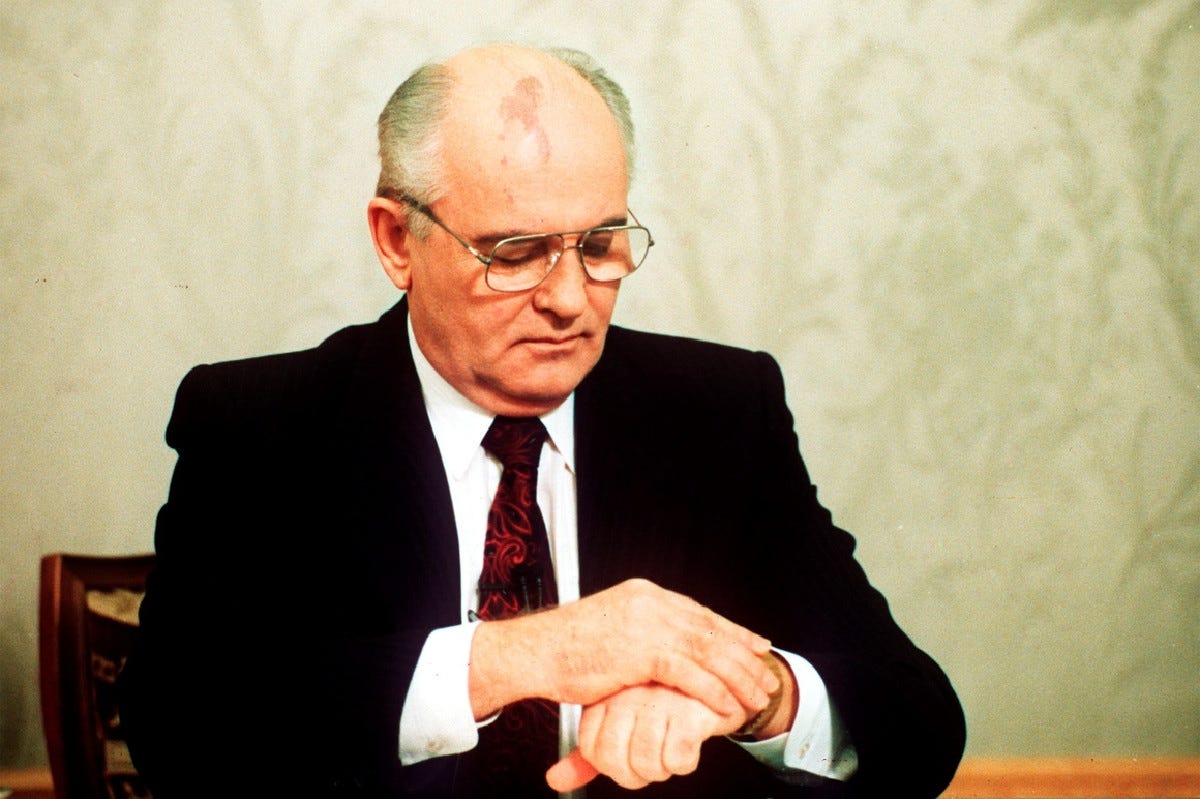Mikhail Gorbachev’s death has led to a predictably wide range of reactions on twitter, from admiration for his role in ending the Cold War, to derision for his inept handling of the Soviet break-up, to incredulity that he was still alive. I myself have always had an ambivalent relationship with the man. On a personal level, he always seemed unlikeable — vain, thin-skinned, impetuous. How can you trust a person who habitually refers to himself in third person? Still, he ended the Cold War and caused to the Soviet collapse, and even if the latter was an unintentional fuck-up whose consequences we are still processing, that is more than enough to secure his spot in twentieth century politics hall of fame. Certainly my life would have been very different and likely worse without him.
Probably the gravest criticism one can level at him is he ended the USSR in a way that immiserated millions and practically guaranteed a later nationalist recrudescence. Without drawing a direct line from Gorbachev to Putin, we can nevertheless see how the humiliating Soviet implosion sowed the seeds of modern revanchism. But if we stipulate that the USSR’s demise was ultimately a good thing, it’s hard to imagine an ending that would have satisfied its victims. A self-inflicted dissolution of a senescent nuclear empire could have gone much, much worse.
One excuse sometimes cited in the West for Gorbachev’s failure is that he was up against an implacable hardline bureaucracy who only wanted to sabotage his reforms. But reading late Soviet history (Zubok is a good example) it quickly becomes clear this was not the case. The party apparatchiks recognized the problems in the system, having been exposed to them first-hand, and were mostly looking to see which way the wind was blowing and how they could take advantage. They were, for the most part, adaptable and pliable cogs of the regime, with no firm ideological commitment to the governing ideology. And looking at the details of the actual reforms, it quickly becomes clear that Gorbachev had no idea what he was doing, especially on the economic front, and worse, seemed to have little patience for the boring details of policy implementation. As a reformer he was inept, and the blame for the catastrophic nature of the collapse must rest mainly with him.
He seems to have been a terrible judge of character. An often-overlooked fact is many post-Soviet autocrats — Shevardnadze in Georgia, Akayev in Kyrgyzstan, Nazarbayev in Kazakhstan, Niyazov in Turkmenistan — started their careers as reformers appointed personally by Gorbachev. Many of the people who tried to overthrow him in August 1991 were his own appointees. Ironically, the fact that by the end he surrounded himself by mediocre people probably saved his life and doomed the coup.
Gorbachev is unique for bringing about the most important accidental achievement in modern history. But that’s only half the story — his other big accomplishment, ending the Cold War, was very much intentional and likely had a greater impact on the modern world than even the collapse itself. (People often conflate the two, but the Cold War was already over by the end of 1989, two years before the collapse.)
It will be interesting to see how Soviet memory is weaponized by the regime in marking Gorbachev's death. The same ingratiating pliancy that so endeared Gorbachev to the West also made him Russia’s most despised ruler since False Dmitry. So far, given Putin’s terse acknowledgment, it seems there will be little fanfare in his own country. I suspect history will be nicer to him, especially in the West. People with grand vision, no matter how poorly executed, tend to be remembered kindly.


